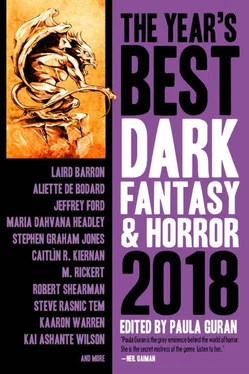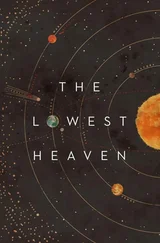Come home to us , her mother called, and, eyes shut to the endless gray, she did.
Survival Strategies
Helen Marshall
Barron St. John must have been nearing his seventies by that point. The pictures I’d copied from magazine covers and newspapers charted his rise from a rake-thin tower of a man, nearly six-three, clad in a badly fitting white wool jacket with a thick crop of black hair cut like a bowl around his ears to his older self: hair grey but still as thick as it had ever been, fine laugh lines etching the curve of that grinning, maniac mouth. In his heyday people had taken him to calling him the King of Horror, a real scaremeister—that term always made me laugh—but the man I saw in those later pictures had the look of a grandfather, which I suppose he was, one who could spin a yarn, sure, but not the kid who’d posed with a shotgun for his university paper under the headline “Vote dammit!”
My university had given me a small grant for my research project into St. John’s career. I had planned to stay in Hotel 31, the cheapest place Luca and I had agreed we could afford. He had wanted me in midtown so I could walk most places. He was a worrier, had never been to New York and the idea of me riding the subway right then made him uneasy.
“It’ll be fine,” I told him, “nothing will happen. It isn’t like that anymore. It hasn’t been since the ’90s.” We both knew that wasn’t exactly true. The situation was different now, but scarier in other ways. There were journalists being stopped at the borders, asked invasive questions. Not everyone was allowed in. And Luca, for all his woolly sweetness and soft English manners, had a serious stubborn streak. He was protective, I knew, and didn’t like the idea of me traveling on my own, not after I’d reacted so badly to the procedure, and certainly not “abroad” as he called it in that charmingly old-fashioned way of his.
But “abroad” was what I had wanted. Even if it wasn’t home for me, which lay four-hundred miles north across the border in Toronto where my sister lived, New York still felt more familiar than the still-drizzly streets of London in the summer. Besides, I suppose there was a part of me that wanted to see how bad things had got.
And St. John was a new obsession of mine, one I’d taken up in my recovery. Luca had been reading his pulpy looking paperbacks for years but I’d never touched them. They were too scary, I’d thought, too low brow. I remembered the garish paperbacks though, the ones that showed off his last name in huge embossed letters. They’d been ubiquitous when I was a kid. Each had a plain black cover with a silhouette cutaway so you had to turn the page to get the full effect. Rosie was the first I ever saw, his debut, the starting point for his surprising upward trajectory. It featured a small New Hampshire town—eerily similar to the one where I’d grown up, what had once been a small farming community until the petroleum processing plants transformed it. The town was engulfed in a crackling lightning storm. Gory and horrifying , read the cover, you can’t put it down!!!
St. John didn’t live in New York, but his former editor did: Lily Argo.
I’d found her email address online. Like St. John she must have been in her seventies, but was still working freelance. There were no pictures. The best I could find was a black and white shot of her and St. John at the signing of his fourth book, What Is Mine , the last they worked on together. Lily Argo was an inch of two taller than St. John, glorious, an Allison Janney look-alike, which meant the two of them towered over the line of moist-lipped teenage girls who were clustered around the table. That was back in ’79.
When I first approached one of my friends—an anthology editor named Dylan Bone (real name or not, I never knew)—about the possibility of an article on the publication of Rosie , he told me Argo had died. Dylan had even written up her obituary for Locus —but in retrospect he couldn’t remember how he’d first found out. She’d been one of the few female editors at Doubleday back then, mostly due to her lucky discovery of St. John. When I mentioned I’d been in contact with her, that she’d agreed to meet me, Dylan had stared at me thoughtfully.
“Just be careful,” he said.
“About what?”
He’d just waved his hand. “You know,” he said before lurching off to the bar to fetch another round.
I didn’t have any problems with the border guards. The customs line was tense, but I’d always had that feeling whenever I entered the States. Once I’d swallowed two painkillers before a flight back to London and the random swipe they’d done on my hands had registered a false positive for explosives or drugs. I’d been taken to a small backroom where a dark-haired woman in a uniform demanded to know why I had been in the country. I kept apologizing, I don’t know why. She had to search me by hand and the process was brusque and businesslike. She asked me to remove my bra. Then someone else came in, a heavy-set man with a broad forehead. He didn’t look at me. Neither of them did. Afterward they let me go but ever since I’d been stopped for “random” checks whenever I boarded a plane. This time though the guard took one look at me and waved me through. I must have looked harmless to him.
Hotel 31 was as old as the Overlook, mostly derelict with a walk-in elevator whose grill door you had to close yourself. The room was sparse, but by that point exhaustion had sunk into my skin. I called Luca to tell him I’d arrived and then collapsed under the thin covers.
All night I could hear animal sounds in the walls. The bodies of whatever moved beyond the peeling wallpaper hummed like batteries. Still, I slept. And in the morning I felt better than I had in weeks. Not mended, but stronger.
I was still in that dusky phase of grieving so that sometimes when I slept it felt I had fallen through a hole in the world. Each morning I woke up as a different person, discovered new wrinkles at the corner of my eyes, wires of thick, unrecognizable, gray hair. The doctor warned me of changes in my body, cramping, small clots of blood between my legs. I had expected my breasts to shrink but they’d only gotten larger. I read online the best thing to do was to bind them tightly with a snug towel and apply ice for ten minutes on, twenty minutes off. He hadn’t told me how old I would feel after.
I had given myself three days to acclimatize to jetlag before I met up with Lily Argo.
In the mean time I’d arranged a visit to Doubleday, St. John’s first publisher. In the last thirty years Doubleday had joined with Dell and Bantam which in turn joined up with Random House. Size, they had thought, was the best way to survive an uncertain economic climate.
Two weeks ago I’d contacted an editor at Random House in the hopes he might know if the company had kept some of the records from St. John’s days. But after the bag search and the metal detectors, when I was buzzed into the offices, a blond receptionist told me my meeting had been postponed. She was young, slickly made up in that New York way with manicured fingers and perfect plucked eyebrows. I was wearing a dark blue cardigan which, seeing her, suddenly felt so English, so matronly I almost laughed.
So I waited in the reception for an hour, browsing the display copies of new books by Margaret Atwood and Chimamanda Ngozi Adichie. They too were slickly produced.
After a while I pulled out my beat-up copy of Strangers and Friends, a collection of short stories St. John had published in gentlemen’s magazines like Cavalier and Penthouse over the years. The book had never been one of St. John’s most popular but I’d been thumbing my way through it slowly for weeks. On the flight I had started a story called “The Survivalist” in which a doctor finds himself trapped alone in a bunker after a nuclear blast. He lives there for years, decades, devouring canned peaches and Spam until finally he comes to the end of his stashed supplies. He knows he doesn’t have many options left. He can open up the door, risk contamination for a sight of the outside world—or he can continue to wait. The doctor stares at the door, wanting desperately to go out, but he can’t bring himself to open it. The story ends as, driven half-mad with hunger, he begins to contemplate how long he could survive eating first the flesh of his legs, his thighs, how much he could withstand. He is a doctor after all, and he thinks it could be quite some time…
Читать дальше












